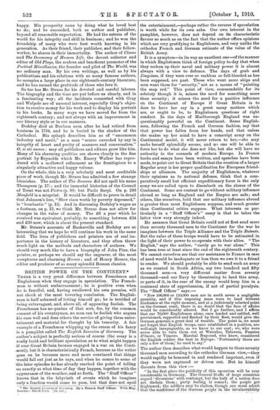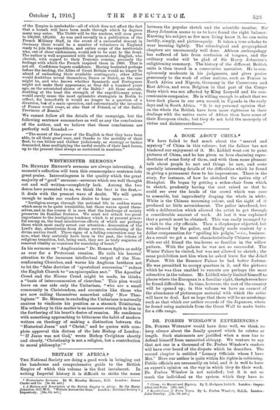BRITISH POWER ON THE CONTINENT.* THERE is a very great
difference between Frenchmen and Englishmen when they engage in speculation. The French- man is without embarrassment ; he is positive even when Ire is fanciful, and, having swallowed his own premiss, will -not check at the moat towering conclusion. The English- roan is half ashamed of letting himself go ; he is terrified of “being extravagant, and, above all, of appearing foolish. The Frenchman has no qualms of that sort, for, by the common consent of his countrymen, no man can be foolish who argues his case well and does others the service of giving them enter- tainment and material for thought by his temerity. A fair example of a Frenchman whipping up the cream of his fancy is a pamphlet called The English Invasion of Germany. The • author's subject is perfectly serious of course (the essay is a really lucid and brilliant speculation as to what might happen iif ever Groat Britain became engaged in a war on the Conti- awn.* but it is characteristically French, because as the writer goes on. he becomes more. and more convinced that things -would fall out just as-he says, and when he comes to some of rthe later episodes he bas already reached the point of telling itis exactly at what time of day they happen, together with the appearance of the 'weather, and so forth., The " Staff Officer" knows that in the labyrinth of events which he imagines only a fraction would come to pass, but that does not spoil ! The English Invasion. of Germany, By a French staff Officer. WWI Dral,.. London : David Nutt. [la. net.]
the entertainment,—perhaps rather the reverse if speculation is worth while for its own sake. Our own interest in the pamphlet, however, does not depend on its characteristic flavour so much'as on the fact that the author offers opinions which are very gratifying to Englishmen, and very unlike the orthodox French and German estimate of the value of the British Army.
It is a symptom-,--in its way an excellent one—of the manner in which Englishmen think of foreign policy to-day that when
they reckon up their naval and military power it is almost
always with a view to defence. The days- of grab and Jingoism, if they were ever so reckless or full-blooded as has been supposed, are past. Those who want more ships and men want them for "security," not as a means of "painting the map red." This point of view; commendable for its
sobriety though it is, misses the need for something more than security ; it misses the need for a positive influence on the Continent of Europe if Great Britain is to
dare to have her say in a great many matters which are, or ought to be, to Englishmen questions of right conduct. In the days of Marlborough England was un- questionably powerful on the Continent. Some English- men, following the French and German fashion, say that
that power has fallen from her hands, and that unless she makes up her mind to have a conscript army on the Continental model, it will never return to her,—she may make herself splendidly secure, and no one will be able to force her to do what she does not like, but she will have no authority in the counsels of modern Europe. In France books and essays have been written, and speeches have been made, to point out to Great Britain that the creation of a larger Regular army is her proper qualification for European friend- ships or alliances. The majority of Englishmen, whatever their opinions as to national defence, think that a com- paratively small but efficient expeditionary force is the only army we are called upon to disembark on the shores of the Continent. Some are content to go without military influence abroad so long as England and the Empire are safe; and others, like ourselves, hold that our military influence abroad is greater than most Englishmen suppose, and much greater than Continental critics suppose. What interests us par- ticularly in a " Staff Officer's " essay is that he takes the latter view very strongly indeed.
He assumes that Great Britain could not at first send more than seventy thousand men to the Continent for the war he
imagines between the Triple Alliance and the Triple Entente. But the value of these troops would have to be estimated in
the light of their power to co-operate with their allies. " The English," says the author, "rarely go to war alone." This has been true at least since the end of the eighteenth century.
We cannot ourselves see that our assistance to France in case of need would be inadequate or less than we owe it to a friend to render. We should probably be able to send such an army as we created in South Africa, say two hundred and fifty thousand men—a very different matter from seventy thousand—and our Navy by threatening to land this army, or parts of it, in the rear of the enemy would keep him in a continual state of apprehension, if not of partial paralysis.
The "Staff Officer" says:-
" Now 100,000 or 110,000 men are in sooth never a negligible quantity, and if this imposing mass were to land without hindrance at the right moment, and at a judiciously selected point on the German coast, there is no doubt that the face of affairs would be considerably altered. But I go further, and I affirm that our 70,000 Englishmen alone, once landed and settled, well provisioned, supported and flanked by their fleet, would give the German generals a great deal of trouble. The point is, we must not forget that English troops, once established in a position, are well-nigh inexpugnable, as we know to our cost ; we, who were never able to turn them out at Waterloo, Talavera, Fuentes d'Onoro, or Vimelro. Marshal Bugeand, who knew, considered the English soldier the best in Europe : 'Fortunately there are only a few of them,' he used to say."
The author then describes what would happen to these seventy thousankl.men according to the orthodox .German view,—they would rapidly be hemmed in and rendered impotent, even if they were, not captured or driven out. But he _himself dissents from this view :—
"In the first place the publicity of this operation will be very considerable in qtermany, Tb.e General Staffs of large countries regard diversions' with .conterapt, but the bulk of a nation does not (Dothan them ; party feeling is roused ; the people get Xrightene4; the soldiers may be shaken, though, one must admit that t.126 confidence of the German pdople in the inVulnerabflity of the Empire is unshakable—a11 of which does not affect the fact that a breach will have been made through which by degrees Many may enter. The 70,000 will be the nucleus, will soon grow to 100,000, 120,000. As was said recently in a publication of the French Military Staff, in the event of a successful descent in Germany there would be a number of volunteers in England ready to join the expedition, and entire corps of the territorials who, out of sheer enthusiasm, would ask to be sent to the front. The author is well acquainted with the present-day English, who cherish, with regard to their Teutonic cousins, precisely the feelings with which the French inspired them in 1860. That is not all. Confidence begets confidence. Having hesitated perhaps before the landing, the Allies of Great Britain would no longer be afraid of embarking their available contingents ; other Allies would doubtless reveal themselves, Danes or Dutch, as the case might be, and who knows whether Spaniards and Portuguese might not make their- appearance, as they did a hundred years ago, on the astonished shores of the Baltic ? All these arrivals, doubling at the least the strength of the expeditionary army, would surely cause the most optimistic strategists in Berlin to reflect, for henceforth it would no longer be a question of a diversion, but of a main operation, and automatically the invasion of France would cease, as also that of Poland, or of the Baltic Provinces of Russia."
We cannot follow all the details of the campaign, but the followirtg sentence summarises as well as any the conclusions of the author, and we believe that those conclusions are perfectly well founded :— " The secret of the power of the English is that they have been able, in all their great wars, and thanks to the mobility of their fleet, to run hither and thither judiciously, as strategy or tactics demanded, thus multiplying the useful results of their land forces, up to the present time always so restricted in numbers."



























































 Previous page
Previous page